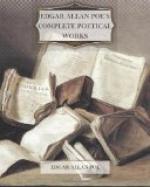To recapitulate then:—I would define, in brief, the Poetry of words as The Rhythmical Creation of Beauty. Its sole arbiter is Taste. With the Intellect or with the Conscience it has only collateral relations. Unless incidentally, it has no concern whatever either with Duty or with Truth.
A few words, however, in explanation. That pleasure which is at once the most pure, the most elevating, and the most intense, is derived, I maintain, from the contemplation of the Beautiful. In the contemplation of Beauty we alone find it possible to attain that pleasurable elevation, or excitement of the soul, which we recognize as the Poetic Sentiment, and which is so easily distinguished from Truth, which is the satisfaction of the Reason, or from Passion, which is the excitement of the heart. I make Beauty, therefore—using the word as inclusive of the sublime—I make Beauty the province of the poem, simply because it is an obvious rule of Art that effects should be made to spring as directly as possible from their causes:—no one as yet having been weak enough to deny that the peculiar elevation in question is at least most readily attainable in the poem. It by no means follows, however, that the incitements of Passion, or the precepts of Duty, or even the lessons of Truth, may not be introduced into a poem, and with advantage; for they may subserve incidentally, in various ways, the general purposes of the work: but the true artist will always contrive to tone them down in proper subjection to that Beauty which is the atmosphere and the real essence of the poem.
I cannot better introduce the few poems which I shall present for your consideration, than by the citation of the Proeem to Longfellow’s “Waif”:
The day is done, and the darkness
Falls from the wings of Night,
As a feather is wafted downward
From an eagle in his flight.
I see the lights of the village
Gleam through the rain and
the mist,
And a feeling of sadness comes o’er
me,
That my soul cannot resist;
A feeling of sadness and longing,
That is not akin to pain,
And resembles sorrow only
As the mist resembles the
rain.
Come, read to me some poem,
Some simple and heartfelt
lay,
That shall soothe this restless feeling,
And banish the thoughts of
day.




